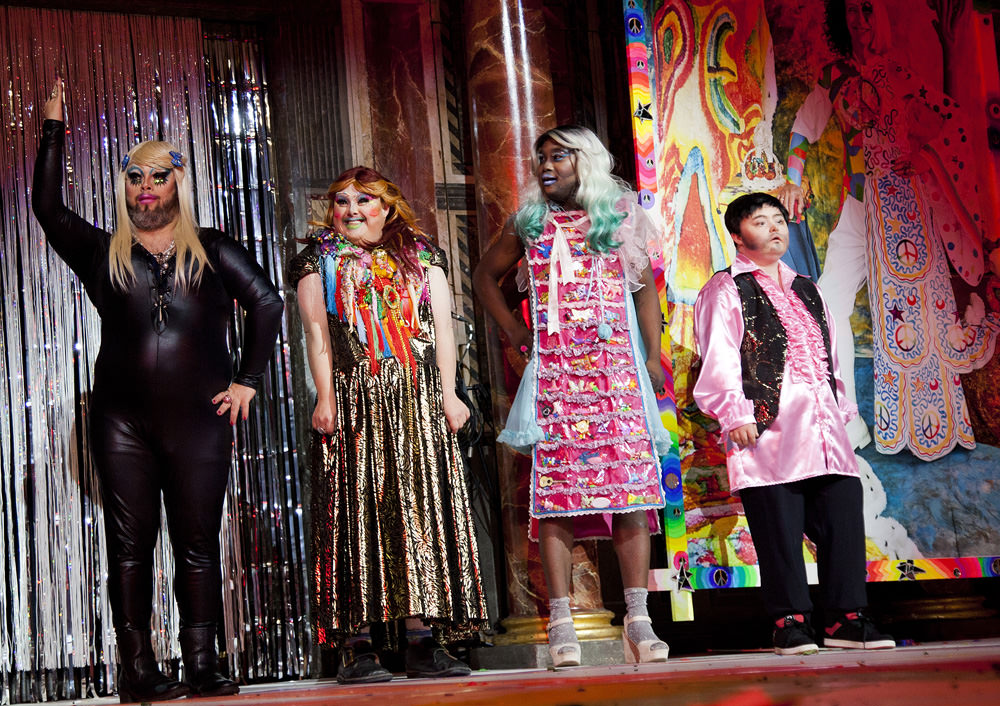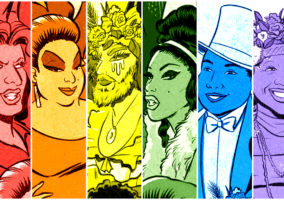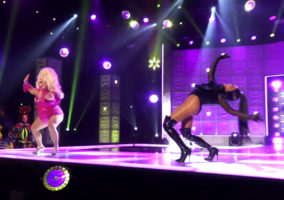
In the final chapter of our book, because we didn’t want to give the impression that legends only walked through history and don’t exist today, we spotlighted a whole bunch of upcoming Legendary Children. The group we were most pleased to highlight and most delighted by their work, was the British drag company of performers with Down Syndrome called – What else? – Drag Syndrome. Now, to our utter delight, they happen to be getting much more attention than when we first put them in our manuscript nearly two years ago. British Vogue has a story up about them, with a lovely short film by Jess Kohl:
“I wanted to change the, ‘oh, they’re so sweet’ reaction that these individuals often receive,” Kohl tells British Vogue. “Drag Syndrome’s artists are radically challenging preconceived notions of sexuality, gender and disability, while being authentically themselves. What about that is sweet?”
That’s it in a nutshell. Your first reaction may be along the lines of wondering what people with Down Syndrome have to do with the world of drag and whether or not it’s “correct” or “appropriate” to “allow” them to express themselves this way, but as we wrote in our book, Drag Syndrome opens up the art of drag “to a group of people uniquely suited to interpreting its skewed take on the world” and is “upholding some of the oldest traditions of drag, consulting its holy texts, and moving the form forward.”
The art of queer drag at its heart is an art form that demands that the audience question their assumptions about the world and its norms; not just through performative femininity (which is how so many people view drag), but by filtering all of mainstream culture through the art form, skewering not just gender norms, but heterosexuality, organized religion, class, and politics. It has always done this, in all its forms. And as drag expands outward in the 21st Century, picking up fans and acolytes that practitioners of the art never could have dreamed of a half-century ago, it’s nothing but a good thing to see it expanded upon by a group of people who see the world from the view of the outsider, from the perspective of the often-ignored. There’s no reason to assume or believe that people with Down Syndrome can’t be artists or performers. In fact, there are plenty of good reasons to consider that they may be particularly well-suited to performative expression.
You may have heard about Drag Syndrome last year when a Republican politician canceled a planned performance in Michigan, calling members of the troupe “special souls” who were being exploited and needed protection. This is nonsense for so many reasons. While we agree that people with Down Syndrome do indeed have a special view of the world and are at a higher risk of exploitation, treating them like placid children strips them of their agency and even their humanity. If children can perform and express themselves through art, there’s no reason in the world to preclude adults with Down Syndrome from the world of drag – and every reason to assume that they might be so good at it that they change the very form itself.
“Our book Legendary Children: The First Decade of RuPaul’s Drag Race and the Last Century of Queer Life is on sale now!
The Los Angeles Times called it “a nuanced exploration of the gender-bending figures, insider lingo and significant milestones in queer history to which the show owes its existence.” The Washington Post said it “arrives at just the right time … because the world needs authenticity in its stories. Fitzgerald and Marquez deliver that, giving readers an insight into the important but overlooked people who made our current moment possible.” Paper Magazine said to “think of it as the queer education you didn’t get in public school” and The Associated Press said it was “delightful and important” and “a history well told, one that is approachable and enjoyable for all.”
Jennifer Lopez in Natasha Zinko on “World of Dance” Next Post:
Erdem Resort 2021 Collection
Please review our Community Guidelines before posting a comment. Thank you!



